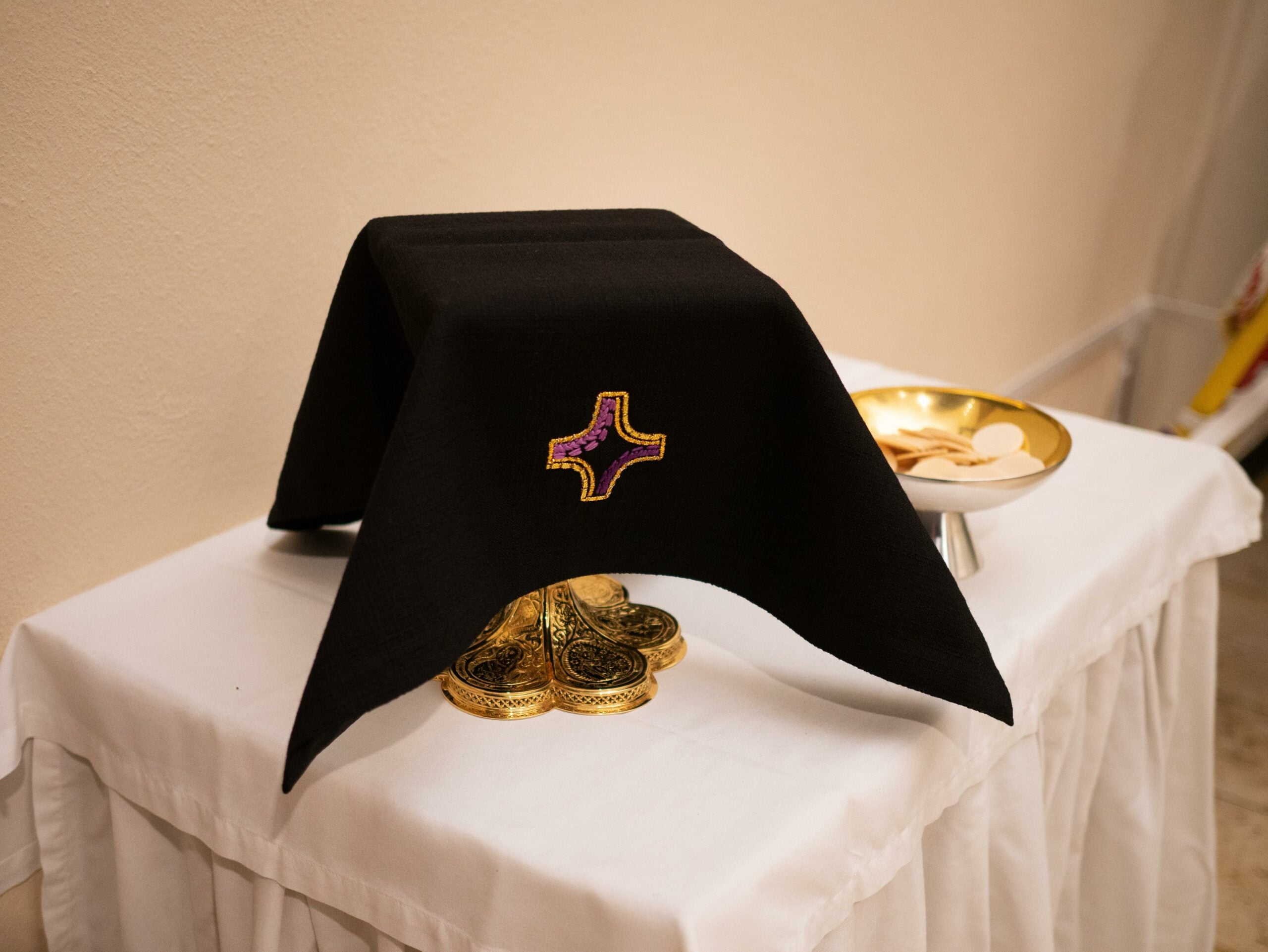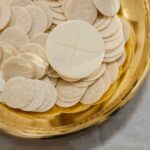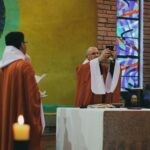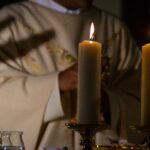In this captivating article, we embark on a profound journey through time, delving into the rich tapestry of human spirituality. Our focus? The history of the Eucharist, a sacred Christian ritual that has endured and transformed over the centuries. Prepare to be enchanted as we unravel the webs of ancient texts, religious symbolism, and the evolution of this revered practice. Join me as we explore the depths of the Eucharist’s captivating past, shedding light on its enduring reverence within the faith.

History of the Eucharist
The Eucharist, a sacred Christian sacrament, holds a profound significance in the realm of spirituality. Its origins can be traced back to the Last Supper, a poignant event where Jesus Christ shared bread and wine with his disciples, symbolizing his body and blood. Throughout the centuries, the Eucharist has undergone an intriguing evolution, shaped by various influences and practices. In this article, we embark on a journey to unravel the captivating history of the Eucharist, exploring its transformation over time and its enduring reverence within the Christian faith.
From its humble beginnings, the Eucharist has remained a central aspect of Christian worship. Originally, it was celebrated every Sunday, but as time progressed, its frequency expanded to daily observance by the 4th century. This evolution of the Eucharist reflects the deepening devotion and understanding of its profound spiritual significance.
The development of the Eucharist drew upon diverse sources, including Jewish prayer and practice. The act of offering praise and thanks to God, inherent in Jewish traditions, resonated with the essence of the Eucharist. Similar to the Jewish synagogue service, the early Christian Eucharist incorporated elements such as biblical readings, psalms, hymns, and prayers into its framework. This synthesis brought a rich tapestry of religious symbolism to the Eucharistic celebration.
As we delve deeper into the history of the Eucharist, it becomes apparent that its transformation was not limited to rituals and external practices alone. The theological understanding of the Eucharist also evolved over time, with profound implications for the Christian faith. Early interpretations of the Eucharist focused on the concepts of commemoration and remembrance, affirming the believers’ connection to the Last Supper and the sacrifice of Christ.
However, as the centuries passed, new layers of meaning were woven into the fabric of the Eucharist. The ancient doctrine of transubstantiation emerged, asserting that during the consecration of the bread and wine, they mysteriously become the actual body and blood of Christ. This profound theological concept added depth and mystery to the Eucharist, strengthening the bond between the sacred ritual and the divine presence.
The evolving history of the Eucharist also reflects the influence of diverse cultures and historical events. As Christianity spread to different regions, local customs and traditions seeped into the practice of the Eucharist, enriching its tapestry. This infusion of cultural elements added vibrant hues to the ritual, making it resonate with the believers in unique and personal ways.
Within the context of the Eucharist’s history, we encounter moments of controversy and division. Disputes over the exact nature of the Eucharist have occasionally led to schisms within Christianity. These disagreements highlight the passionate devotion and deep reverence that believers hold for this sacred ritual. The ongoing dialogue and theological reflections surrounding the Eucharist testify to its enduring importance within the Christian faith.
In conclusion, the history of the Eucharist is a captivating tapestry woven with threads of devotion, theological reflection, cultural influences, and spiritual significance. From its humble origins in the Last Supper to its evolving understanding and practice throughout history, the Eucharist continues to inspire and uplift believers across the globe. As we delve into the intricate details and explore the nuances of this sacred Christian ritual, we gain a deeper appreciation for its enduring impact on the hearts and souls of the faithful.
“The history of the Eucharist is a testament to the transformative power of faith and the eternal longing of humanity to connect with the divine presence.”
The Eucharist is a sacrament that holds a deep significance for followers of Christianity. Unveiling the mysteries behind this sacred ritual will undoubtedly captivate your curiosity. Delve into a wealth of knowledge and discover intriguing facts about the Eucharist by clicking here: facts about the eucharist. Prepare to be enlightened and amazed as you embark on a journey of spiritual enlightenment.
The history of the Eucharist is a fascinating subject that delves into the roots of this integral religious sacrament. Discovering the origins and evolution of this sacred practice can shed light on its present-day significance. Exploring eucharist history can reveal the rich traditions and beliefs surrounding this holy ritual. Take a deep dive into the historical significance of the Eucharist, allowing it to provide valuable insights into its role within religious studies. Learn more about the religious, cultural, and social aspects tied to the Eucharist by visiting our comprehensive page on religious studies eucharist. Embark on an enlightening journey as you explore the compelling history of the Eucharist and its place in various religious practices and beliefs.
To learn more about the intriguing history of the Eucharist, click here. Discover the lasting impact and historical significance of the Eucharist by diving into its intriguing past here. For a comprehensive understanding of the Eucharist within the context of religious studies, navigate to our page on religious studies eucharist here.
The Evolution of Eucharistic Worship: Unveiling Centuries of Change
[youtube v=”cOa5dDawxVA”]
History of the Eucharist: Tracing the Origins and Evolution of a Sacrament
The Eucharist, a profoundly significant ritual within the Catholic Church, has undergone a remarkable journey of transformation throughout its two-millennia history. Dating back to the Last Supper, where Jesus shared bread and wine with his disciples, the Eucharist has evolved with changing practices, cultures, and theological interpretations. From its humble beginnings as a communal gathering to its elevation as a grand spectacle of reverence, the Eucharist has shaped and been shaped by the Catholic Church.
The Eucharist-Making Church: A Formation of Faith Communities
During the first millennium of church history, the primary focus of the Eucharist centered on how it formed and guided the Christian community. Commemorating the sacrifice of Christ, the Eucharist made the church a tangible representation of the body of Christ. In these early times, worship took place in intimate settings, emphasizing the communal nature of the celebration. The bishop, the central unifying figure of the faith community, became the chief celebrant, underscoring the importance of leadership in the Eucharistic ritual.
“The Eucharist made the church for them, the true body of Christ.”
The Eucharist-Making Church: Embracing Unity Amidst Diversity
As the centuries passed, the Eucharistic theology underwent a transformation. By the end of the first millennium, a shift occurred, with a growing fascination regarding the doctrinal aspects of the Eucharistic species itself. The focus shifted from how the Eucharist formed the church to how the church, through its blessing and authority, affected the Eucharist and other sacraments. Precision and uniformity became paramount, and unified liturgies and standardized prayers replaced the once-varied regional practices. Priests emerged as the principal celebrants, and the laity’s role in the Eucharistic ritual diminished.
“The focus of the mass became the celebrant’s ability to affect the sacrament properly.”
A Sacrament Wrapped in Mystery: The Eucharistic Speculations
Throughout the Middle Ages, the Eucharistic theology faced intense scrutiny and speculation. Questions regarding the presence of Christ in the Eucharist, the necessary conditions for the sacrament, and even the consequences of accidental desecration became hotly debated. In response to these issues, the church emphasized the true presence of Christ in the Eucharistic species, reiterating its significance. The celebration of the Eucharist became more elaborate and solemn, transforming into a private spectacle that separated the sacred from the profane.
“The Eucharistic species on the altar became the true body of Christ, emphasizing the great power and mystery.”
Reflections on the Evolving Eucharistic Worship
The history of the Eucharist showcases the ever-changing expressions of worship and theological perspectives. From the early emphasis on communal participation to the later focus on the celebrant’s power to affect the sacrament, the Eucharistic worship has adapted to the needs and beliefs of different time periods. The Second Vatican Council eloquently affirmed the Eucharist’s enduring significance: “a sacrament of love, a sign of unity, a bond of charity, a Paschal banquet.”
“The expression of worship grows, changes, builds, and lives, just as we as a faith community do.”
The Eucharist: An Enduring Pillar of Catholic Faith
As the Catholic Church continues to evolve, the Eucharist remains an integral part of its identity and spirituality. Throughout history, disputes over the nature of the Eucharist have occasionally led to divisions within Christianity. However, the ongoing theological reflections and dialogues signify the enduring importance of this sacrament. As we journey through time, our reverence for the Eucharist may shift, highlighting different aspects of faith, but it is crucial to maintain a delicate balance between the Eucharist making the church and the church making the Eucharist. In doing so, we remain faithful to the words of our Savior: “This is my body, do this in memory of me.”
Quote:
“The expression of worship grows, changes, builds, and lives, just as we as a faith community do.”
By understanding the historical evolution of the Eucharist, we gain a deeper appreciation for its significance within our faith and the profound role it continues to play in our worship and spiritual journey. As we navigate the complexities of tradition, doctrine, and cultural influence, we find solace in the transformational power of the Eucharist, drawing us closer to our Savior and reinforcing our sense of community in the ever-changing landscape of the Catholic Church.
FAQ
Question: What is the origin of the Eucharist?
Answer: The Eucharist originated from the Last Supper of Jesus Christ with his disciples. During this final meal, Jesus shared bread and wine with his disciples, instructing them that the bread symbolized his body and the wine symbolized his blood.
Question: How often was the Eucharist celebrated in its early history?
Answer: Originally, the Eucharist was celebrated every Sunday. However, by the 4th century, it began to be celebrated on a daily basis.
Question: How was the development of the Eucharist influenced by Jewish prayer and practice?
Answer: The development of the Eucharist drew inspiration from Jewish prayer and practice, particularly the offering of praise and thanks to God. This influence can be seen in the eucharistic formula and the structure of the ritual.
Question: What elements were included in the eucharistic celebration?
Answer: The eucharistic celebration included biblical readings, psalms, hymns, and prayers. These elements were incorporated into the ritual, adding depth and meaning to the sacrament.
Question: What sources can provide more information about the history of the Eucharist?
Answer: For more information about the history of the Eucharist, you can refer to scholarly texts and studies on religious studies, particularly those that explore Christian sacraments, the Last Supper, and the development of ancient rituals.
- Senior at What Age: Benefits & Eligibility Guide - March 29, 2025
- Unlocking Senior Benefits: How Old is a Senior? Your Complete Guide - March 29, 2025
- Master Russian Politeness:A Guide to Saying Please - March 29, 2025
















